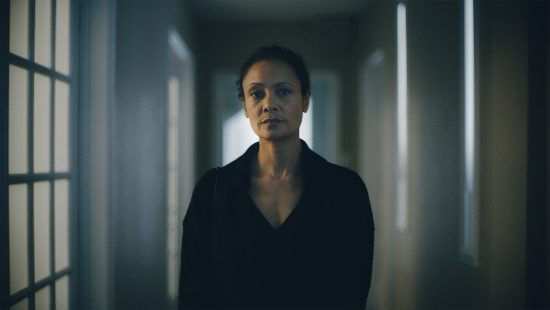Sundance 2022 Review: God’s Country – “A film without clear answers, instead seemingly meant to provoke conversation”

Thandiwe Newton appears in God’s Country by Julian Higgins, an official selection of the Premieres section at the 2022 Sundance Film Festival. Courtesy of Sundance Institute.
In 2015, director Julian Higgins adapted a short story from author James Lee Burke, Winter Light into a short film. It told the story of a college professor confronting two hunters that trespass on his property. Now, writing alongside Shaye Ogbonna, the two adapt the story to a feature film, God’s Country, and change its protagonist from a white man to a woman of colour, played by Thandiwe Newton. This alteration brings new complexities to the film, that alongside its themes of grief and boundaries add explorations of gender and race.
“Sometimes it feels like things will never change. But I promise you they do,” Sandra (Newton) assures her students at the Montana college where she teaches a public speaking course. That she wants them to use her words to change the world contains an element of foreshadowing, as words will eventually not be enough for Sandra.
On the second day, the truck is back, and she confronts the two men. “I heard about you,” one comments, the aggression and meaning in this white man’s words palpable as he glares at her. But on day three and four the truck is still there. Sandra tries to get the Sheriff’s deputy (Jeremy Bobb) to intervene but he is honest with her that getting law enforcement involved in this community may only escalate things. That said he’ll go and talk to the gentlemen. “Why do you keep calling them gentlemen?” Sandra asks.
This slow burn of a modern western continues to intensify through seven days of torment for Sandra. Seven days that includes not only the intrusion of these men, but the failure of her college to expand its diversity and live up to its promises amongst the other microaggressions Sandra experiences daily. When a teaching assistant brings up an uncomfortable situation with her male superior Sandra’s patience is tested further. “We have to fight back, all the time, or this is going to go on forever.”
As Sandra reaches her breaking point, Thandiwe Newton shows us just what sort of powerful talent she has always been. The film rests on her more than capable shoulders as she builds up this sense of vast frustration, emotion and irritation. Coupled with the grief and trauma of Sandra’s past, she is a powder keg ready to explode. The two hunters are simply one more thing for her to battle, a symbol of all these external factors invading into what she wanted to be a peaceful existence.
Higgins does attempt to humanize the hunters, at least one of them, showing him driving his elderly mother to church. Sandra briefly connects with him until his bigoted thoughts take over again. But Higgins wants to show their life outside of these confrontations, that they’re part of a larger community in this vast open space, so beautifully captured by cinematographer Andrew Wheeler. It certainly doesn’t lend sympathy to the men, but is part of the social and political commentary at play.
God’s Country is a film without clear answers, instead seemingly meant to provoke conversation. As things escalate both in the encounters with the two men as well as Sandra’s turmoil, she becomes the aggressor. The hunters literally become the hunted. In its conclusion, at the end of this week of endless confrontations she finally decides enough is enough, controversially taking matters into her own hands in a way that makes you wonder if what comes after for Sandra is worth it. But understandably she is tired. Tired of it all. And on the 7th day, she rested.

Warning for those sensitive to scenes with animals – a dead deer is shown. While the action is not shown on screen a dog is shot and body shown from afar.









